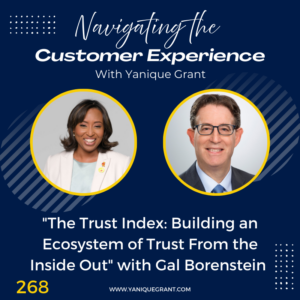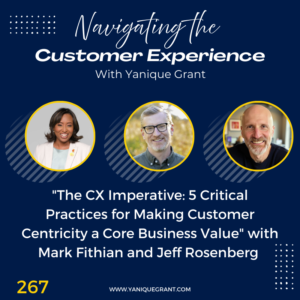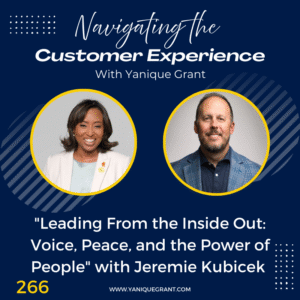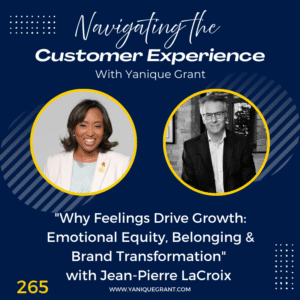Adam Toporek is an internationally recognized Customer Service Expert, Key Note Speaker, and Workshop Leader. He is the Author of “Be Your Customers’ Hero: Real-World Tips & Techniques for the Service Front Lines” as well as the founder of Customers that Stick Blog. When he is not speaking or delivering high energy Customer Service Key Notes or Workshops, he can be found co-hosting the “Crack the Customer Code Podcast” and writing extensively on customer experience. Adam has an MBA and a Certificate in Customer Experience; he is also a Net Promoter Certified Associate.
Questions
- What is your Zodiac Sign?
- Would you say being people oriented, outgoing and very sociable are true characteristics of your personality?
- Tell us a little bit about yourself and your journey
- On a global level, do you think there has been any improvement in customer experience or do you think it is getting worse?
- How do you get people to develop a culture of service, a mindset where everything is in alignment with the customers in mind?
- Have you found that sometimes empathy is lacking in terms of the organizations’ connection with their customers and do you think it’s driven by how people are brought up so they are not able to connect with the customer when they are venting?
- In your book, you speak about 7 service triggers; can you share a little about that and explain what that means?
- Do you think it’s important for the entire organization to be exposed to emotional intelligence so that they can be better able to manage their own emotions?
- From a customer experience perspective, what are some considerations for entrepreneurs online to consider as it relates to customer experience and having a successful business?
- What are your thoughts on training and does it have a different connotation in the mind?
- How do you stay motivated everyday?
- What is the one online resource, website, tool or app you cannot live without in your business?
- Can you share what are some of that books that have had the biggest impact on you?
- What is one thing in your life right now that you are really excited about – something that you are working on to develop yourself or your people?
- Where can our listeners find your information?
- What is one quote or saying that you live by or that inspires you in times of adversity?
Highlights
- Adam shared that his sign is Sagittarius which is the early part of December. One unique fact about a Sagittarius is that they are extremely out going, and they are very people oriented and very sociable. Adam stated that he was not sure of the characteristics of a Sagittarius but that he believes those are definitely true of a person who is very good at customer experience and customer service.
- Adam Toporek stated that he is a 3rd generation entrepreneur, so business is in his blood. His grandfather owned a main street shoe store, his father started a wholesale business in the back of his mother’s retail children’s clothing store, so he grew up around business and doing sale tags and that has always been a part of who he is. As he opened his own businesses and went further along in his career, he eventually owned his retail business and got involved in franchising, one of the things he found was that in your own business, you could be the Chief Operating Officer, Chief Marketing Officer, Chief Plumbing Officer; you’re everything but the part he always gravitated towards was customer experience and customer interaction. And the more he interacted with his customers, he realized how important the idea of customer experience was. Over time he started talking about it and then writing about it publicly on blogs, it then developed a following, it developed into a book, then into speaking and into key notes. But what he finds fascinating is that the journey that lead him there comes from having to be face to face with customers and having to work with employees that are face to face with customers and seeing the challenges and the struggles they had to deliver good customer experiences even when they wanted to.
- Adam stated that globally, expectations have changed; they are different from what they use to be and customers understand what good customer service is supposed to look like and then he also thinks customers sometimes have unrealistic expectations based on viral stories of customer service and that the customer is always right. These days customer service is the biggest source of competitive advantage for almost any organization. If you are not competing on experience, and you are in a competitive industry, you are in trouble.
Adam Toporek shared that to get business owners to focus on customer experience and develop their team members to translate that experience they deliver to the customers on a face to face basis, over the telephone or on social media, can only start with the numbers; there are many statistics that tends to open eyes. If you can use an organization’s own numbers that is helpful, you could use their survey data their ranking or their NPS. He stated 85% of customers are willing to pay more for a superior customer experience, your retention equals profit. There are 3 different studies that show acquiring a new customer is anywhere from 5-10 times more expensive than retaining an existing one, yet most people put their time and energy into marketing instead of retention and customer experience efforts. Customer experience also affects moral and how their culture and employees feel and how they interact. Customer experience permeates the entire organization and you have to start with the numbers and the economic argument especially persons in the C-Suite, business owners or people higher up in their organization, they tend to be run by numbers.
- Adam shared that one of the things is that you’ve got to do is walk the talk as a leader. If you don’t have a customer centric culture, if you’re not leading from the top, if what they see from you as a leader is that customers are numbers and customers aren’t people then they are not going to treat them like people. There is nothing you can do for employees if you don’t first start doing yourself. You have to help people understand that they are dealing with human beings and that what they do matters. Adam Toporek stated that he has a chapter in his book, “Be Your Customers’ Hero” called “Everybody’s Rushed, Everybody’s Stressed”, because nowadays nobody has enough time and those are our customers, they don’t want to be hassled, they want to have easy experiences. A lot of the time employees will say this is just another retail job and this doesn’t mean anything and this doesn’t matter and the thing is to have a purpose and a mission to make them understand that purpose and mission centers around making peoples day better whether you are selling t-shirts, selling medicine or online software, whatever the services are around that, you are making a difference in peoples’ lives, you are impacting peoples’ lives. When you help them connect and if you help them understand the human on the other side of the phone, desk or email; that is one of the first steps in getting them to have a customer centric attitude and to act on it.
- Adam stated that there are a lot of factors at work like organizational and upbringing. He shared that one of the things he often teaches is that we are not biologically designed to be good at customer service. That is one of the reasons he focuses on training and why training is important. We have all of these things referred to as Cognitive Biases, there is negativity bias, human beings tend to look for negative information over positive information, we tend to give more weight and power to negative information instead of positive information and that makes sense, the brain’s job is to keep us alive. We have defense mechanisms, so when someone yells or screams at us, it is not natural for us to go, “Thank you for telling me sir, how can I help you better?” It is not a natural reaction, you have to train yourself to depersonalize, you have to train yourself to look at the other persons perspective not what they’re saying about you, not how you’re feeling. It is easy to empathize with somebody who is not being negative or who is not attacking you or your organization and it comes from caring and anybody that is built for caring or has been trained that the customer is important can find that empathy. It still is a trainable skill and it is still something you need to filter for because not every person should be in a customer facing role, there are some people that simply just should not have customer facing jobs but assuming that you have the right team, you have the right people on the bus, you can train empathy for easy situations but then you have to really train for them to not only empathize but depersonalize and to be able to be calm when the storm is coming and the communication skills and the techniques you need to help take that situation and move it down the road to a positive resolution.
- Adam stated that what is really interesting about the service triggers is that they are a preventative tool. When you talk about customer service, everybody wants to solve the problem that they already have, “How do I deal with a difficult customer? How do I this?” The service triggers are designed to create fewer problems to deal with, so the idea of the trigger is based on our psychological mechanism and we all have those triggers that could have been from when a song comes on the radio and you start to feel emotional, you look back and say that was the song your grandmother used to sing to you when you were little because that’s a trigger for you. We all have these personal triggers whether they be positive or negative and there are certain triggers throughout the population that are service triggers that are hot buttons for people in customer service situations where they tend to get really upset. Adam identified (7) triggers and not everybody has them equally and not everybody has them but when you’re looking at it at an organizational level, what you do, is try to approach it by “How could we prevent these from being pulled?” The first two triggers are “Being ignored” and “Being abandoned.” You’ve walked into a restaurant and watched the hostess walk back and forth and not even make eye contact. Being abandoned, they say they can’t handle that for you and will have the manager call you back tomorrow and what happens tomorrow? Nobody calls you, and what happens when you call them? You’ve been abandoned; you’ve been left on hold for 30 minutes. And these are triggers, so this happens at a restaurant and it’s your favorite restaurant, you might say it was a bad night, a new hostess and you’ll give them a break. But if you go in a second time and the hostess ignores you, you’re not going to wait 3 minutes, you’re going to wait 30 seconds and what happens is that we have these triggers that we carry from organization to organization cause once you’ve been sent from department to department, and wasted hours trying to get answers to your questions, you can get quick on the trigger. So if you ever experience this in your customer experience life, the customer gets an employee and they are saying “I have to send you to a different department or have my manager call you” and they say “What’s the manager’s name? What time will they call? Who do I call if I don’t hear from them?” and then they start going through a list of things. That’s a trigger, they know they have been burned before, they’ve been shuffled (another trigger), they’ve been abandoned. So what we do is look at the customer journey, we look at each touch point in the journey, particularly the major ones and say, “How could a customer feel ignored here? Are they not greeted in time? Is the phone not picked up fast enough? How could a customer feel abandoned?” And when you go through all seven (7) service triggers, if you can prevent these seven service triggers, you can revolutionize your customer experience by starting there.
- Adam Toporek shared that emotional intelligence has a frame work with it. It has to have the idea of being in touch with who you are and not only who you are but how you relate to customers. Adam Toporek in his book, stated that the first 3 sections are really about mindset because that’s how important it is. The first section is about the mindset of the customer service representative: how do we feel.
Everybody not only needs to come to grips with themselves and their own triggers and their own cognitive biases and their own ways of approaching customers and customer experience but also how they interact with each other, with their team, all of that mixes together to kind of create the perfect culture. Those are the things you strive for in creating a culture that is mixed with empathy across and throughout the organization and by looking inside yourself.
- Adam shared that the first thing to do is to map your customer journey because small businesses never do that, solo entrepreneurs and consultants rarely ever sit down and say, “What is my customer’s journey?” “Where do people come in, what marketing are they seeing?” “Where are they finding me, my twitter, my blog, this podcast?” And then what happens “What expectations am I setting? What is my response time? What is the next thing that happens?” You then look at the journey and look at what you think it is now and what you want it to be, what do you want your customers to experience? What do you want your response time to be? And how often do you want to monitor your channels? How do you want to communicate with your customers? Where do you want your business to live, is it on Skype, on email? If you look at your journey and go through from beginning to end, every piece of your brand that a customer or prospective customer can touch and then you take the approach of looking at each touch point and saying, “How can I make this touch point great? How can I make sure I don’t mess it up?” Adam stated that one of the concepts he teaches is that he breaks up the touch points and pressure points because there is not enough time if you try to focus on everything, nothing is going to get done, he says we all say everything is important in customer experience and it is. You have to start with the big rocks, you look at the pressure points, what are the 3-5 big moments when you interact with the customer and it may be to close the sale, when they sign up for your programme, when they buy your speech, when they buy your product or when there is a customer service issue, look at those big pressure points first. Get those as tight and prefect and then work on as many touch points as you can.
- Adam stated that he agrees with the concept of development rather than training as there have been a lot of bad training and there have been a lot of training when people sit in a class for a day or a half day or 3 days and then everything went back to normal but what is particularly harmful is when you have training and you don’t have the culture to support what they learn in the training. He stated that if a company brings him in and he gets the team jazzed up and ready to help customers and they have the skills and they are feeling more confident now on how to handle difficult customers, providing them with communication tricks, helping them to work on their mindset and then they go back to a culture where there is nothing but just rules and policies and managers that are yelling about numbers and nobody seemingly cares about customers, then you wasted your money because it won’t be effective.
Being customer centric and wanting to help the customers has to be in the DNA of the organization. And that resistance to training is because it is not part of the whole package, it’s just like “customer service is down, let’s get a trainer.” They are really not getting the whole suite and to fit a square peg into round hole – just will not work.
- When asked how he stays motivated every single day – Adam Toporek shared that he just does as he has always been doing….staying goal oriented; he looks at his goals regularly. One of the things he does is try to stay healthy and fit as it makes all the difference. He has a treadmill desk, so staying healthy helps the mechanics of the internal motivation and also he loves what he does, he trains and teaches and he has always enjoyed teaching and he likes helping people solve problems and teaching people new things. When he can teach somebody how to deal with customer service, it’s not easy but some of what they are dealing with is easy and he can help, so it is really rewarding and that’s the biggest thing to teach people and to help people make their lives better and be more successful in their jobs.
- One tool, website, resource or app that Adam shared he cannot live without because of all his travelling is TripIt. Trip It manages all his trips and he said it is insanely cool, so you get your email from your airline, you get your email from your hotel, just forward it to TripIt and it puts it in an itinerary with all of your codes and your confirmation numbers and the phone numbers and it puts everything in order, so it will do your flights, the hotel check in, then the flight and your hotel check out, it puts in the rental car. It also does alerts if your flights are running late, so instead of signing up with each different airline, you just send everything to TripIt and it alerts you. This app is available on App Store and Google Play Store.
- When asked what are some books that have had the greatest impact on him – Adam Toporek shared “How To Win Friends & Influence People” by Dale Carnegie this book is about how you interact with people, how to treat people and how you communicate with people. Another book Adam shared that has had the greatest impact is called “Deep Work: Rules for Focused Success in a Distracted World” by Cal Newportand his thesis is essential. Today one of the greatest things you can do if you are in a knowledge field, is take time to do deep work, to really focus on getting rid of the noise. The author really dives deeply into the idea and shows people how they have done it and different modules for doing it, that idea of really having focus time to work on projects and to think and create great things. He stated that it is a valuable book for him because it is what he believes in intuitively.
- When asked what is one thing he is working on to develop himself or his people that he is really excited about – Adam shared that he is hitting a long-term goal as it is something that he always wanted to do but it never made the cut which is to create an online training because it is truly the future and it’s getting more virtual everyday and he is launching his first online customer service training course coming out the first week of September and he has a couple other concepts that he’s working on, so hopefully there will be 2 or 3 online training courses out by the end of 2016. The first one being released is based on the 7 service triggers.
- Adam says listeners can find him online on any of the below links:
- Adam shared his quote that he refers to in times of adversity and challenges and really contributes to his very own success – “Nothing in the world can take the place of persistence. Talent will not; nothing is more common than unsuccessful men with talent. Genius will not; unrewarded genius is almost a proverb. Education will not; the world is full of educated derelicts. Persistence and determination alone are omnipotent.”
- The other is a poem called “If” by Rudyard Kipling.

New Online Course – Mastering Customer Experience and Increasing Your Revenue – 50% off for all who sign up in September…..A Must Have Course for all Business Owners, Entrepreneurs – https://bit.ly/50OFFMCXIR
Links
- “Be Your Customers’ Hero: Real-World Tips & Techniques for the Service Front Lines” by Adam Toporek
- Crack the Customer Code Podcast
- TripIt
- “How To Win Friends & Influence People” by Dale Carnegie
- “Deep Work: Rules for Focused Success in a Distracted World” by Cal Newport
- Customers That Stick Website
- Adam Toporek Twitter
- Adam Toporek LinkedIn





